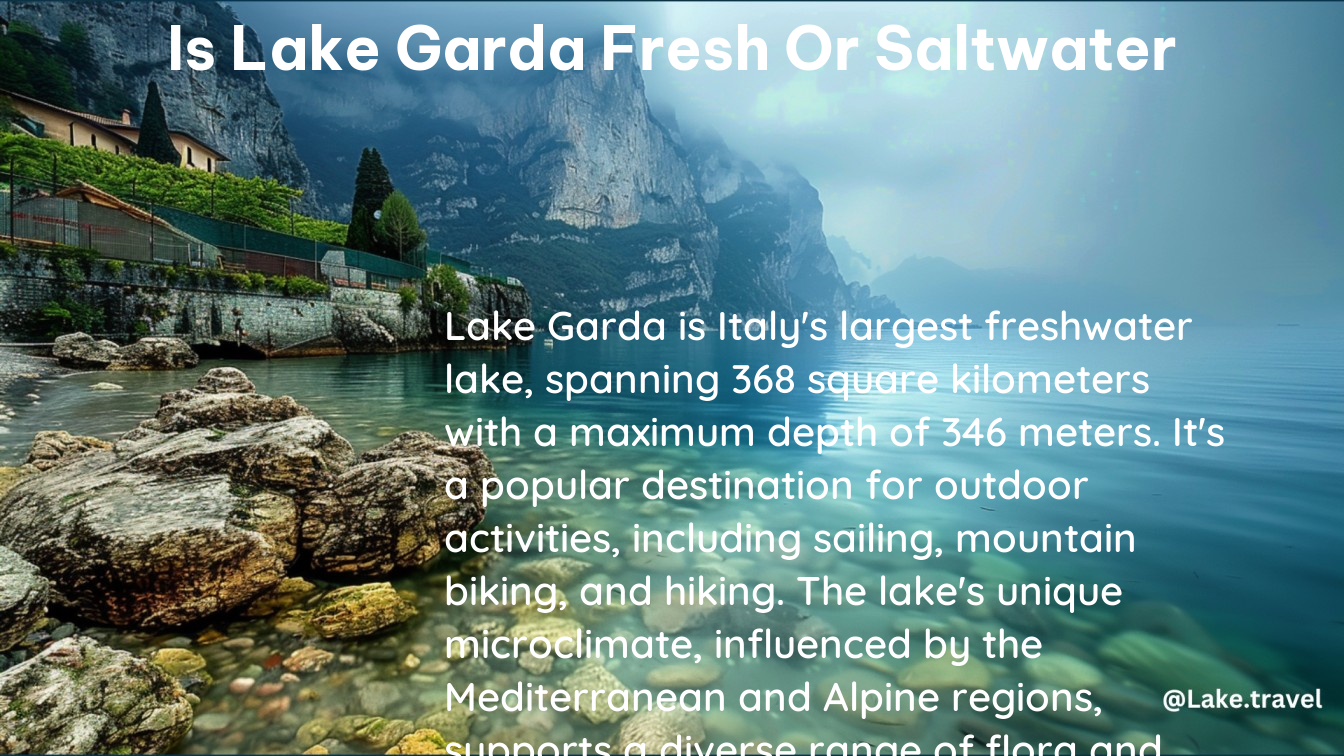Lake Garda, the largest natural freshwater lake in Italy, is a captivating destination for lakes enthusiasts. Nestled between the picturesque landscapes of Lombardy, Trentino, and Veneto, this stunning body of water is a true gem in the heart of the Italian countryside.
Lake Garda is a Freshwater Lake
The most definitive answer to the question “Is Lake Garda fresh or saltwater?” is that Lake Garda is a freshwater lake. This means that the water in the lake is not salty like the water in the ocean, but rather it is a natural body of freshwater.
Freshwater Characteristics of Lake Garda
There are several key characteristics that confirm Lake Garda’s status as a freshwater lake:
-
Water Source: Lake Garda is fed by several rivers and streams, including the Sarca River, the Ponale River, and the Varone River. These are all sources of freshwater that flow into the lake, maintaining its freshwater status.
-
Water Composition: The water in Lake Garda is not saline or brackish, but rather it is composed of freshwater. This is evident from the presence of freshwater fish species, such as the carpione, a rare salmonid fish that is endemic to the lake.
-
Water Usage: The freshwater in Lake Garda is used for various purposes, including irrigation, drinking water supply, and the production of hydroelectric power. These uses would not be possible if the lake were saltwater.
-
Lack of Tides: Unlike saltwater bodies like the ocean, Lake Garda does not experience tides. The water level in the lake is primarily influenced by rainfall, snowmelt, and the inflow of freshwater from the surrounding rivers and streams.
Comparison to Saltwater Lakes
To further emphasize the freshwater nature of Lake Garda, it is helpful to compare it to saltwater lakes. Saltwater lakes, such as the Dead Sea or the Great Salt Lake, have a much higher concentration of dissolved salts and minerals, making the water highly saline and unsuitable for many freshwater species and human uses.
In contrast, the water in Lake Garda is relatively low in dissolved salts and minerals, allowing for a diverse ecosystem of freshwater plants and animals to thrive. Additionally, the lake’s water can be used for drinking, irrigation, and other purposes that would not be possible with saltwater.
Unique Features of Lake Garda

Beyond its freshwater status, Lake Garda boasts several other unique features that make it a captivating destination for lakes enthusiasts:
Geographical Location and Landscape
Lake Garda is situated in the northern part of Italy, nestled between the regions of Lombardy, Trentino, and Veneto. The lake is surrounded by a diverse landscape, including the rugged mountains of the Alps to the north, the rolling hills of the Lombardy region to the south, and the picturesque towns and villages that dot the shoreline.
This unique geographical location and the surrounding landscape contribute to the lake’s microclimate, which is often milder than the surrounding areas. This allows for the growth of Mediterranean-style vegetation, including olive trees, lemon groves, and vineyards, which are a hallmark of the region.
Biodiversity and Ecosystem
As a freshwater lake, Lake Garda supports a rich and diverse ecosystem. In addition to the carpione, the lake is home to a variety of other freshwater fish species, including trout, perch, and carp. The lake’s shores and surrounding areas are also home to a wide range of bird species, as well as a variety of plant life.
The lake’s ecosystem is further enhanced by the presence of several nature reserves and protected areas, such as the Parco Naturale Regionale del Lago di Garda, which help to preserve the delicate balance of the lake’s flora and fauna.
Cultural and Historical Significance
Lake Garda has a long and rich history, with evidence of human settlement in the region dating back to the Neolithic period. Over the centuries, the lake has been an important hub of trade, transportation, and cultural exchange, with the surrounding towns and villages developing their own unique architectural styles, culinary traditions, and artistic heritage.
Today, Lake Garda remains an important cultural and historical destination, with numerous historic sites, museums, and cultural events that celebrate the region’s rich heritage. Visitors can explore ancient Roman ruins, medieval castles, and picturesque villages, all while enjoying the stunning natural beauty of the lake and its surroundings.
Conclusion
In conclusion, Lake Garda is undoubtedly a freshwater lake, with a wealth of unique features and characteristics that make it a captivating destination for lakes enthusiasts. From its diverse ecosystem and rich cultural heritage to its stunning natural beauty, Lake Garda is a true gem in the heart of the Italian countryside.
Whether you’re a nature lover, a history buff, or simply someone who appreciates the beauty of the great outdoors, Lake Garda is a destination that is sure to leave a lasting impression. So why not plan your next lakes touring adventure and discover the wonders of this magnificent freshwater lake for yourself?
